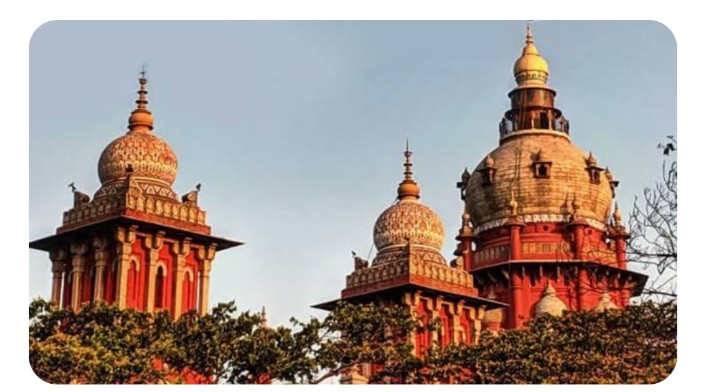Justice KK Ramakrishnan has used its discretion to order the conduct of the trial in jail upon consideration of factors like life threat to the accused, witnesses and hostile atmosphere. In that context, it was said that, “In the present case also, the extra ordinary circumstances demands the extraordinary remedy. According to this Court, the extraordinary remedy that would satisfy the present case situation is commencement and conclusion of trial in both cases in the jail premises.”
[10/18, 09:09] sekarreporter1: Home Top stories Latest Updates News Court Updates Columns Interviews Job u
Home > Court Updates > High Courts > “Extraordinary…
“Extraordinary Circumstances Require Extraordinary
Remedy” – Madras HC While Ordering Murder Trial To Be
Conducted From Jail Premises
A Madurai High Court Bench of Justice KK Ramakrishnan has used its discretion to order the conduct of the trial in jail upon consideration of factors like life threat to the accused, witnesses and hostile atmosphere.
In that context, it was said that, “In the present case also, the extra ordinary circumstances demands the extraordinary remedy. According to this Court, the extraordinary remedy that would satisfy the present case situation is commencement and conclusion of trial in both cases in the jail premises.”
It was also observed that, “The direction to conduct the trial in jail is not a new one and the Hon’ble Supreme Court and also various High Courts justify the trial in jail premises upon considering the various factors like life threat to the accused, witnesses and the hostile atmosphere. As per Section 327 Cr.P.C (corresponding old Section 352 Cr.P.C), it is permissible to conduct the trial in the jail premises and the same was considered by the Hon’ble Supreme Court and various High Courts in different occasions.”
Senior Counsel N Anandhapadmanabhan appeared for the appellant, while Additional Public Prosecutor T Senthil Kumar and Counsel A Robinson appeared for the respondents.
The case revolved around a past incident where the deceased, P.K. Muthukumar, worked as a practicing advocate in the Thoothukudi and Tirunelveli Bar Association. He and his brother, P.K. Shivakumar, were involved in opposing bail applications for the accused in Shivakumar’s murder. As a result, the accused hatched a plan to eliminate Muthukumar, perceiving him as an obstacle to securing bail. The accused, including the appellant, were alleged to have conspired to murder Muthukumar, who was fatally attacked on 22.02.2023 in Thoothukudi.
A case was registered under several sections of the Indian Penal Code (IPC) and the SC/ST (Prevention of Atrocities) Act.
The prosecution argued that the appellant played a role in facilitating bail for one of the accused through financial support, backed by evidence such as bank transactions and phone records. Despite the appellant’s claim that the primary evidence against him was coaccused confessions, the Trial Court denied his bail application, leading to the appeal before the High Court.
The Court observed that all the witnesses were under fear psychosis, owing to which the Court was not inclined to grant bail. In that context, it was said that, “The SC/ST(POA)Act specifically emphasizes to provide the adequate protection to the victim and witnesses. In this case, the appellants and other accused eliminated one of the witnesses in the earlier case. Further, there is a continuous life threat to the defacto complainant also. The respondent police also registered another crime number in Crime No.176 of 2020 registered for the offence under Section 294(b) and 506(i) IPC, for the criminal intimidation to the defacto complainant. As on date, all the witnesses are under the fear psychosis. In the said circumstances, this Court is not inclined to grant bail.”
The Court relied on the Supreme Court judgment of Chaman Lal v. State of Uttar Pradesh to outline the ingredients to be considered while granting bail, as followed:
(i). Nature of the accusation and severity of the punishment in the case of conviction and nature of the supporting evidence.
(ii). Reasonable apprehension of tampering with witness or apprehension of threat to the complainant.
(iii). Prima satisfaction of Court in support of the charge.
Observing that all the ingredients were made out in the case, the Court held that the appellant was not entitled to bail.
The Court further noted that, “In the peculiar circumstances of the case, dismissal of this appeal alone would not serve the purpose. On the one hand, the accused are inside the jail without getting bail, and on the other hand, the witnesses are under the perpetual and constant threat and only available family member eyewitness to the occurrence is the second respondent”, owing to which the special remedy was provided.
Cause Title: Sutherson vs The Deputy Superintendent of Pol
Copyright @2023 Powered by Hocalwire
[10/18, 09:10] sekarreporter1: 👍
![[12/18, 08:53] Sekarreporter1: https://youtu.be/g0MCKmnwvug [12/18, 11:07] Chandrasekar Mhc Advt: *CHANDRU LAW ACADEMY* inviting you to *online* *coaching* for *JUDICIAL EXAMINATION/MAGISTRATE/APP* Subject : *The Indian penal code ,1860* Title: Chapter -XVII *Of offences Against property BY: *R. CHANDRASEKARAN* ADVOCATE Date: 18 December 2020 TIMING: 6:45 to 8:15pm For contact whats app. No: 9080448871 *Today’s tips for Judicial aspirants * * Passive Euthanasia is Permissible * In March 2018, a Five-Judge Constitutional Bench, headed by Chief Justice *Dipak Misra* in common case *( A Registered Society) Vs. Union of India, WP (civil) No.215 of 2005 * gave legal Sanction to Passive Euthanasia,Permitting *’Living Will’* by patients on withdrawing medical support if they slip into Irreversible Coma, *SC HELD*: The Right to Die with Dignity is a Fundamental right.](https://sekarreporter.com/wp-content/themes/hueman/assets/front/img/thumb-medium-empty.png)